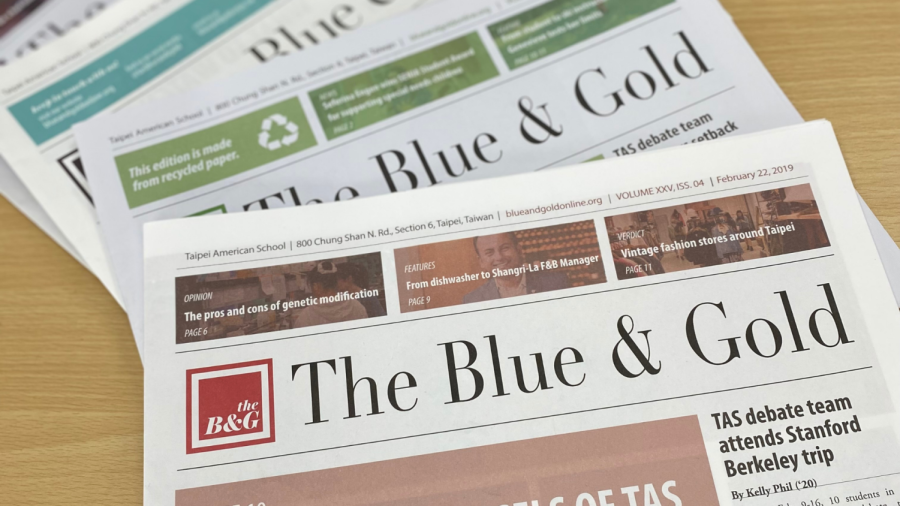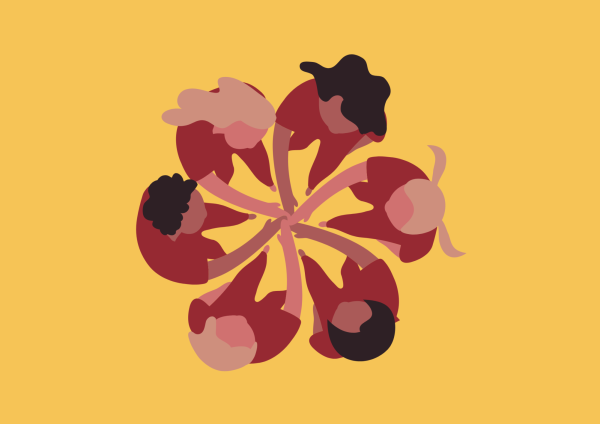It’s Scholastic Journalism Week — let’s revisit our press freedom rights
In 1988, the Supreme Court of the United States granted public schools the right to censor student news for school and student safety in the case Hazelwood v. Kuhlmeier. For public schools in the U.S., this was a pivotal moment, shifting from almost complete student press freedom (since 1969) to a much more limited exercise of First Amendment rights.
However, the extent to which student-journalists may exercise their scholastic press freedom varies among private and public schools in the U.S. as well as at Taipei American School (TAS), a nonprofit, American, international and private school in Taipei, Taiwan.
In honor of Scholastic Journalism Week, let’s evaluate our rights as student journalists at The Blue & Gold.
In contrast to public school student publications in the U.S. that possess clear (while limited) First Amendment Rights, essentially guaranteeing some freedom of expression s, The Blue & Gold does not have any First Amendment rights for the obvious reason that in Taiwan, we do not have the United States Constitution and, it follows, that without the U.S. Constitution, we have no amendments to that document allowing us additional freedoms.
Being a student journalist at an American school in Taiwan means that we are taught about such freedoms without full possession of them. It is true that the Republic of China does have a general provision for freedom of speech in its own constitution (Chapter II, Article 11), but it does not have the same historical precedence as American citizens have and there are additional laws that temper its enforcement in Taiwan.
Additionally, The Blue & Gold faces further layers of limitations on free speech as we operate under the influence of a private school administration – something which our student journalist counterparts in private schools in the United States also face Essentially, when students and their families choose to attend private schools, they choose to join an organization that is not government funded and that organization is allowed to enact various behavioral restrictions on members of its organization. This isn’t always a bad thing, especially when it comes to student discipline and safety; but it does murky the waters for student speech.
The press regulation and libel laws in Taiwan are curated to protect the subject of the story, not the journalist. For instance, if a journalist published a story on a theft and reported it with accuracy and truth, as long as the thief could prove that the story had clear and tangible damage to their reputation, then the journalist, not the thief, would face legal repercussions. In contrast, in the U.S., if a journalist could prove that the story was true, then they would not be found guilty. Hence, reporting in Taiwan requires an added layer of sensitivity, which often prompts self-censorship as journalists decide not to pursue stories that, though true, may damage their own reputation, finances, and even safety.
Some Blue & Gold stories deemed potentially controversial go through the school administration before they are published. This is true in private schools in the United States as well and is not uncommon. In this process, there are times when the administration advises the writer or editorial board to prevent certain parts of the article from being published. The most common reason for this is because the administration wants to protect student privacy, but there have also been instances when the administration has restricted parts of articles if the article seems to promote legal disobedience or content that could contribute to negative physical or mental health. Again, this is not uncommon in US private schools, but it is something that warrants explicitly saying here.
Given this, The Blue & Gold (along with most American private schools) faces complex layers of restrictions, regulating our news flow and oftentimes constraining our content. We must uphold the sensitivity standards set by our administration and the newspaper’s bylaws, which prevent many stories from going to press or published to its maximized level of comprehensiveness.
As student journalists at an American school, we are taught to report with American values of press freedom, but it is hard to uphold that American education in a legal context that does not align with U.S. First Amendment rights. In celebration of Scholastic Journalism Week, as student journalists at The Blue & Gold, we recognize this legal barrier by practicing careful reporting, and ultimately, we hope that you all, as readers, can dissect, analyze and consume our journalism with that awareness.


![A myriad of impressive trophies and awards. [ANNABELLE HSU/THE BLUE & GOLD]](https://blueandgoldonline.org/wp-content/uploads/2025/09/Awards2-600x256.jpeg)
![Students' calendars say goodbye to exam week. [ANNABELLE HSU/THE BLUE & GOLD]](https://blueandgoldonline.org/wp-content/uploads/2025/09/Exam-week-600x370.jpg)
![A collection of college flags. [PHOTO COURTESY OF AMBER HU ('27)]](https://blueandgoldonline.org/wp-content/uploads/2025/05/IMG_5029-600x289.jpeg)

![An SAT word cloud. [PHOTO COURTESY OF WORDCLOUDS]](https://blueandgoldonline.org/wp-content/uploads/2025/05/SAT-600x600.jpeg)